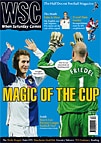 The PFA has celebrated its centenary at a time when players aren’t held in especially high regard. But that doesn’t mean the union’s battles weren’t worth winning, says John Harding
The PFA has celebrated its centenary at a time when players aren’t held in especially high regard. But that doesn’t mean the union’s battles weren’t worth winning, says John Harding
In December 1907, a group of Manchester United players entered a hotel in the city centre and created admiring headlines by forming a union. One hundred years on almost to the day, another group of United players, at another city-centre hotel, created altogether different headlines, ones that must have had PFA chief executive Gordon Taylor weeping tears of frustration.
Taylor and the PFA had dedicated their centenary to the One Goal, One Million campaign, aimed at raising £1 million to equip a children’s cancer ward in Manchester. The campaign was seen as the perfect riposte to those who saw footballers as millionaire wastrels with no social or moral scruples. As Taylor explained: “We wanted to celebrate our anniversary in style, but we also wanted to celebrate it with a purpose."
The sordid goings-on at the Great John Street Hotel appeared to make a mockery of that admirable goal. Not that players’ union founder Billy Meredith would have been too surprised. Meredith wanted to give the players a credible voice in the corridors of football power as such responsibility, he hoped, might engender maturity. Players, he wrote, “are, as a whole, an over-generous careless race who do not heed the morrow”.
Since the union’s troubled formation when it fought to survive in the face of establishment opposition, its officials have toiled away, making a little money go a long way. In the early days the union’s main source of cash came from players’ subs of a shilling or so and the occasional fund-raising match. Accident insurance, provident schemes for retirement and further-education programmes remained pipe dreams for decades.
Before the lifting of the maximum wage in 1961, the union’s principal job was to negotiate the wage parameters within which all professional players operated. Minimum and maximum wage levels, summer and winter payments, appearance money, talent money, TV and floodlit appearance fees – these had to be painfully extracted from tight-wad League officials who, with a few notable exceptions, regarded players as little more than paid servants.
At every level, a pro’s life was an insecure one. They often lived in a “club” house from which they could be ejected at a moment’s notice. They were generally poorly educated, having left school with no qualifications, and, at career’s end, frequently found themselves desperately seeking manual work. In the absence of anyone else showing much concern, the PFA made a crucial difference to many, providing various small welfare benefits, representing members in compensation claims against clubs and funding a rudimentary insurance scheme for those who suffered career-ending injuries.
Poorly paid themselves and massively overworked, PFA secretaries down the years have, almost without exception, been long-serving and utterly dedicated. Jimmy Fay (whose membership drives were crucial in keeping the union alive) joined in 1907, took over as secretary in 1929 and was still serving in this capacity in 1953. Jimmy Guthrie (whose brainwave it was in 1957 to secure a ten per cent cut in TV revenues) joined in 1938 and left in 1957. Cliff Lloyd, the architect of the successful Eastham case that helped smash the retain-and-contract system, served for over 25 years, while Gordon Taylor’s involvement with the union as a member and employee now spans 47 years.
With such a wealth of experience to draw on, it’s no surprise that, when TV monies started to flow into the PFA’s coffers in the 1980s, the organisation was well primed to seize the moment, not only to provide properly and handsomely for its members but also to become proactive in crucial areas of the football industry. Not only has PFA cash helped many struggling clubs to survive, it has also been channelled into ground-breaking “football in the community” schemes. It has pioneered apprentice education programmes and scientific studies into players’ injuries, and introduced challenging coaching schemes, influential reports on player discipline and a much praised anti-racism campaign.
At the launch of the PFA Centenary Appeal last February in Manchester, Joey Barton, then of Manchester City, admitted: “I have made some mistakes over the years, but the PFA have always helped me.” Unfortunately, players have not always helped the PFA. But accepting an OBE in the New Year’s honours list, Gordon Taylor remained optimistic: “I accept this award on behalf of the football family and it is a tribute to the game itself that we are held in such high regard.”
Billy Meredith, however, was always a more sceptical soul. While conceding that his fledgling union had achieved enormous feats down the century, he might still have insisted, just as he did back in 1907: “The unfortunate thing is that so many players refuse to take things seriously but are content to live a kind of schoolboy life…”
From WSC 252 February 2008